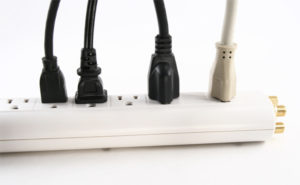 Electrical fires and accidents are common causes of injury and death in the home. Nearly every home has potential electrical hazards caused by incorrect or defective electrical wires, improper electrical connections at outlets or switches, and frayed appliance or extension cords, just to name a few.
Electrical fires and accidents are common causes of injury and death in the home. Nearly every home has potential electrical hazards caused by incorrect or defective electrical wires, improper electrical connections at outlets or switches, and frayed appliance or extension cords, just to name a few.
Electrical safety in the bathroom is often overlooked, and outlets that are too close to a water source or handling an electrical appliance with wet hands heighten the chances of getting an electric shock. In wet surroundings, unsuitable equipment can become “live” and make its surroundings live too. That is why Ground Fault Circuit Interrupter (GFCI) outlets are required in bathrooms and other wet areas as part of the electrical code.
Here are additional ways to practice electrical safety in the bathroom:
Never use a radio, hair dryer, phone, extension cords or electric devices in the bath, near the sink, bathtub, or on a wet bathroom floor.
Electric water heaters in a bathroom must be fixed, permanently wired, and fitted at least 9 feet away from a water source in the bathroom.
Electrical outlets in bathrooms should be GFCI outlets, installed by a professional electrician at the required distance from sources of water.
Recessed lights are recommended in bathrooms to keep fixtures away from water.
While you may be tempted to bring an electric heater into the bathroom, be sure that it is at a safe distance from a water source and the floor it sits on is bone dry.
Always have a fire extinguisher handy in order to avoid a very common error of using water to put out electrical fires. Water fuels the fire and may cause electrocution. In the absence of a fire extinguisher, always turn off your electrical power from the main source in the event of an electrical fire, evacuate your home and call 911.
Remember to switch off and unplug the equipment from use immediately and store it out of reach of children.
Avoid Do-It-Yourself electrical repairs by all means necessary. Instead, have a qualified electrician inspect your wiring on a regular basis to ensure the wiring is safe and to see if you need an upgrade.

